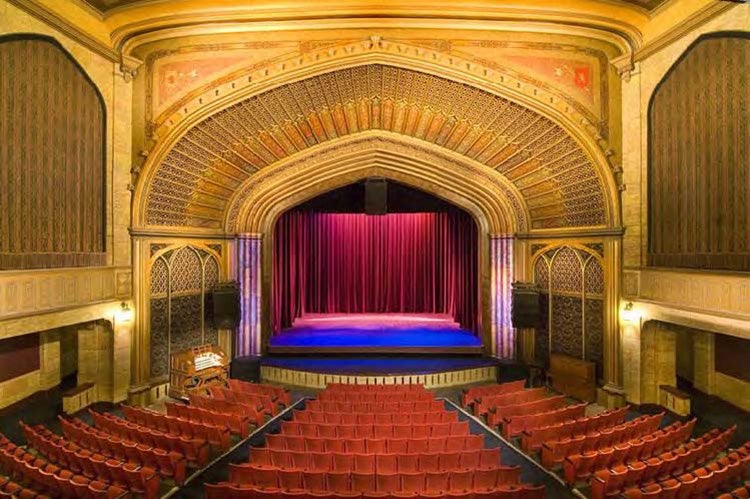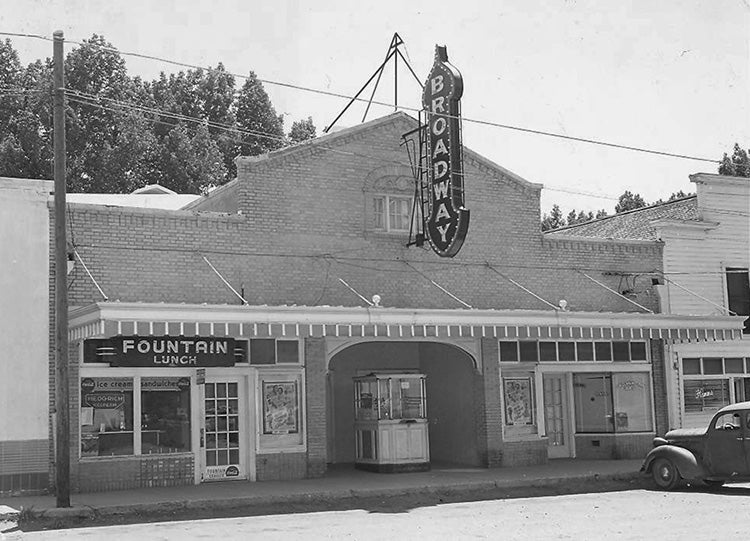A blueprint to preserve, rehabilitate, and promote historic theaters in Oregon has earned national honors in applied research for a team of University of Oregon graduate students who analyzed the physical and fiscal conditions of more than fifty historic theaters statewide. But they didn’t stop there: Their findings spurred them to also recommend a five-year plan to help both the aging buildings and the often-underfunded organizations that operate them.
The American Institute of Certified Planners (AICP) recognized the team’s efforts with the 2016 AICP Student Project Award in Applied Research for their report, “Oregon Historic Theaters: Statewide Survey and Needs Assessment.” The AICP will present the award April 5 in Phoenix, Arizona, at the American Planning Association’s annual national conference.
The competitive award recognizes the outstanding work by graduate students in the UO’s Community and Regional Planning and Public Administration programs, housed in the Department of Planning, Public Policy and Management (PPPM), and the Historic Preservation Program.

Above: Elsinore Theatre in Salem, Oregon, was designed by Ellis F. Lawrence, former A&AA dean. Courtesy Elsinore Theatre.
Valerie Hubbard, AICP president, noted that the UO project was “selected from a very competitive pool of applicants, and this award is a testimony to your hard work and commitment to excellence. We anticipate your continued contributions to the profession.”
The student research team included Rodney Bohner, John Jackson, Dana Nichols, and Craig Wiroll.
Their research revealed that the many shuttered or struggling theaters—former cultural and economic linchpins in their communities—remain potential catalysts for downtown revitalization but face deferred maintenance and financial and organizational challenges.
“Many of these ornate and extravagant buildings were placed in smaller towns and neighborhoods that relied on the economic income of these theaters,” says Wiroll, a public administration graduate student. “Once the market for cinema and film dropped off, the cornerstones of these communities were decimated. That resulted in the abandonment of these buildings—buildings that we found could be rehabilitated and utilized as an economic asset rather than an abandoned liability.”
The survey identified four key challenges facing historic theaters: tight finances, aging infrastructure, increased competition, and lack of coordination among owners-operators for sharing opportunities.
Team members were captivated by what they learned during the nearly yearlong project.
“What I have discovered through my research is that every theater in Oregon, and in the country, has a unique and important story to tell, and I feel that part of our job here at the Community Service Center is to broadcast those stories,” Nichols, a community and regional planning graduate student, wrote on the team’s blog. “Theaters are community assets [and] community treasures.”
Bohner, a historic preservation graduate student, said the team was “surprised by creative solutions that theater operators are using to ‘turn the tide.’ We were [also] definitely surprised by the number of loyal historic theater fans and historians who believe in the ability to save these theaters and offered to help throughout the project. We are thrilled to see the use of the findings and recommendation from our project to help guide the next steps in saving these cultural icons.”
Community Planning Workshop (CPW) Project Coordinator Aniko Drlik-Muehleck lauded the students for both their work and work ethic.
“It is very challenging to complete a project of this scope while maintaining a full course load,” she said. “The team powered through, and I am so proud of the personal growth I witnessed in them.”

Above: Broadway Theater in Malin, southeast of Klamath Falls. Image courtesy Basin Youth for Christ.
A five-year action plan to address the theaters’ needs began August 2015 by the UO’s Community Service Center and partners Restore Oregon, Oregon Main Street, the Oregon Heritage Commission, Oregon Film (the Governor’s Office of Film and Video), Oregon Arts Commission, Oregon Regional Solutions Team, and Pacific Power.
Community Planning Workshop students have a solid history of winning AICP competitions.
“This is the fourth national AICP award CPW has received since 2004,” Program Director Robert Parker said. “The award validates our pedagogical approach and underscores the ability of students to complete professional quality work.” CPW students previously won AICP awards in 2004, 2009, and 2011.
“We know from external reviews of our program that we admit excellent students and our curriculum and experiential learning does an exceptional job of enhancing their skills and abilities,” added Richard Margerum, PPPM department head. “That this is the fourth time a CPW project has won this award really reinforces that we are a national leader in experiential learning.”
The project is already making a difference for the theaters and their communities, Parker noted.
“Travel Oregon, the project funder, is delighted with the results and is already working to market historic theaters to Oregon travelers. Restore Oregon, a nonprofit that advocates for historic preservation, received grant funding to develop a toolbox for theaters on key issues like ADA accessibility, structural assessment, and business planning. CPW is part of the Restore Oregon team and is excited to continue the work.”
Winning an award for their efforts was a bonus for the students, all of whom were won over by the theaters they visited during their research.
“As a lifelong film aficionado, I couldn't have asked for a better project,” Wiroll says. “Being able to combine a lifelong passion for film with applied research that will help to improve communities in the great state of Oregon is straight out of a Hollywood script, and the AICP is our Academy Award. I can't promise any sequels, but I hope the state of historic theaters in Oregon continues to improve due to our research. Go support your local historic theater!”
